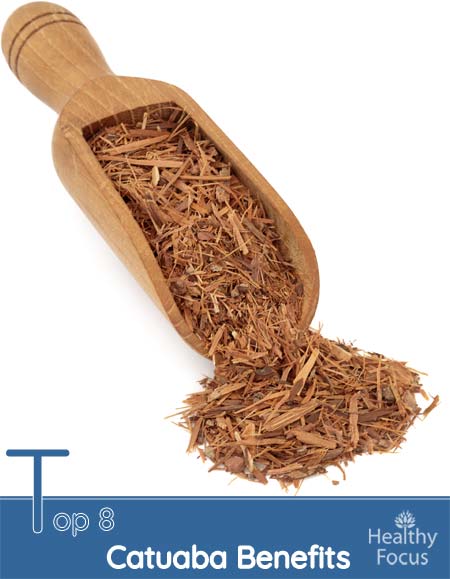Last Updated on September 2, 2023 by Marc Seward
What is Catuaba?
The Amazon forest is home to countless medicinal herbs and plants and is the home of the relatively small but fast growing Catuaba tree known mainly for its aphrodisiac abilities. The tree itself produces yellow flowers and an inedible fruit but it is the bark which is harvested for its medicinal properties and made into supplements.
Catuaba or Anemopaegma mirandum comes from a tree known scientifically as Erythroxylum vacciniifolium which belongs to a larger family of trees. There is quite a bit of confusion regarding the actual tree species harvested for use and products from both the small catuaba and big catuaba trees are used for the same purpose and marketed interchangeably. The bark from the catuaba tree is sometimes referred to as trichilia catuaga.
Traditional use of Catuaba
By far and away the main historical use of catuaba is as an aphrodisiac. Its purported aphrodisiac quality was first discovered by Brazil’s Tupi Indians several centuries ago. By all accounts, they were so impressed with its sexual abilities that they composed numerous songs of thanks in praise of its incredible libido enhancing quality and its ability to treat erectile dysfunction.
Generations of Indigenous Brazilians have continued to use catuaba bark over the years and it has remained one of the Amazon’s most famed and sought after aphrodisiacs. As well as being used as an aphrodisiac, it has been used in Brazil to stimulate the central nervous system, to calm nerves and boost memory.
While it is used today for nervous system disorders, it is still mainly revered as a cure for impotence and male libido. Brazilians have used it for centuries with no ill effect and it is regarded as a safe aphrodisiac that has a proven efficacy.
Despite this long history of use and the glowing testimonials, there is no scientific evidence that it works as an aphrodisiac and reviews that I have read have been decidedly mixed. Not only is the research lacking regarding its aphrodisiac benefits but the research into its other medicinal benefits and its chemical composition is also extremely slight.
Catuaba for Cancer
According to research, catuaba contains tannins, alkaloids like catuabine, fatty resins and aromatic oils. It also possesses certain flavonoids, sesquiterpenes and phytosterols. Research published in 2007 discovered that catuaba bark contained epicatechins which are powerful antioxidants said to have both antibacterial and anticancer properties. (1)
Uses of Catuaba
As I mentioned in the previous article, not much research exists into the purported medicinal uses of catuaba but this certainly does not mean that it has no uses. The fact that this herb has been used for so long, especially as an aphrodisiac suggests that there may well be some benefits while the lack of any adverse effects can be implied from the same length of use. In fact, an expert on the extract Dr. Meira Penna states that the only side effects from taking catuaba are very pleasant ones-erotic dreams and an increased sexual appetite.
Catuaba Benefits
1. Aphrodisiac
While the Western jury might still be out and I certainly recommend a healthy dose of skepticism when it comes to purported aphrodisiacs, catuaba is enjoying ever increasing popularity in the Brazilian market. It is still used primarily as an aphrodisiac in Brazil.
Recently it has started to appear as an ingredient in aphrodisiac supplements in the United States. Unfortunately, studies have suggested that the quality and content of these supplements varies a great deal so make sure that you purchase it from a reputable supplier.
2. For the Nervous System
As well as being used historically for sexual purposes, Brazilians have long been using the catuaba root extract to treat a range of conditions related to the nervous system. I am unable to find any concrete proof of its efficacy but these days it is often recommended by herbalists to treat neuralgia, sciatica and other nervous system complaints.
3. Anxiety and Stress
Like so many other herbal medicines, catuaba is used for its ability to deal with a range of emotional disorders related to stress. How effectively it works is open to debate but it is often recommended for anxiety disorders, nervousness and insomnia.
4. Antidepressant Ability
The most commonly prescribed current treatments for depression are very often accompanied by unwanted and often extremely nasty side effects while proving ineffective for a large percentage of the people taking them.
For that reason, it is certainly desirable to find a safe natural alternative remedy for depression. There has been some research done that suggests catuaba might be a potential treatment for the debilitating symptoms of depression.
A study published in 2005 was conducted to analyze the antidepressant effects of catuaba extract. The study conducted on mice used the forced swimming model to determine its effects and concluded that the study provided convincing evidence that certain active compounds in catuaba had antidepressant like effects. The researchers went on to say that the purified constituents of the bark were of potential future interest for depressive disorders. (2)
5. Focus and Memory
Catuaba is sometimes used as a general tonic to balance and strengthen overall body functions while it is also said to boost memory and enhance focus.
6. Anti-Inflammatory
A 2004 Study found that Catuaba totally inhibited PLA2 activity (4). PLA2 is involved in the inflammation response. High levels of sPLA2 are present in people with Alzheimer’s and MS. By inhibiting PLA2—Catuaba likely has anti-inflammatory properties.
7. Oxidative Stress / Brain Damage
Catuaba was tested in a 2012 study done on rats subjected to oxygen and glucose deprivation (5). The study found that Trichilia catigua (catuaba) could be effective as a preventative agent against brain damage.
8. Antimicrobial
A 1992 study done with mice showed Erythroxylum catuaba alkaloids had a strong protective effect. The mice were give lethal doses of E. Coli and Staph–opportunistic infections that can affect HIV patients. The catuaba extract inhibited HIV spreading into the cells and protected against the infections. The researchers concluded catuaba may have a potential fighting opportunistic infections in HIV patients. (6)
How to take Catuaba
Because of its increasing popularity, catuaba can be taken in a variety of different forms these days. If you can’t physically find it locally, it is readily available online in capsule and tincture form. By all accounts, maximum effectiveness is achieved by adding the tincture to a drop of water and then adding a tablespoon of lemon juice.
This is recommended because acidifying your tincture helps release the tannins, alkaloids and other constituents. Native Amazonians often combine catuaba with another herb known for its aphrodisiac ability called Muira Puama. The aphrodisiac qualities of both are said to be enhanced by combining the two.
Considerations
As with any other herbal remedy, you should be very careful to get your product from a reputable supplier. When it comes to catuaba extract, this seems to be even more important than usual as research suggests that a lot of unethical practice exists.
A study published in 2004 examined 14 samples of catuaba extract that were being sold commercially. All of the extracts were being marketed and sold as catuaba extract from the erythroxylum, trichilia or anemopaegma species. The researchers involved tested each of these commercial samples for purity and found that they varied wildly.
As well as differing alkaloid concentrations, fewer than half of the samples actually contained the chemical constituents being advertised on the labels with over a half being adulterated with other crude drugs. (3)
Catuaba Side Effects
Despite its many long years of use and the lack of any reports into adverse effects, care should always be taken before you decide to take any new herbal medications.
- Because of its effect on the central nervous system, it is possible for people using it to experience headaches and dizziness especially when first taking it.
- Caution is advised when taking any libido enhancing medications as adverse reactions are always a small possibility. The opposite effect to the one desired can occur and you should stop taking the supplement if you experience a loss of libido.
- There is no research regarding the use of catuaba for children or pregnant women so stay on the safe side and avoid taking it.
(1) http://www.ncbi.nlm.nih.gov/pubmed/18020420
(2) http://www.ncbi.nlm.nih.gov/pubmed/15991001
(3) http://www.ncbi.nlm.nih.gov/pubmed/15490329
(4) https://www.ncbi.nlm.nih.gov/pubmed/15597313
(5) https://www.ncbi.nlm.nih.gov/pubmed/23001398
(6) https://www.ncbi.nlm.nih.gov/pubmed/1525337



Leave a Reply
You must be logged in to post a comment.